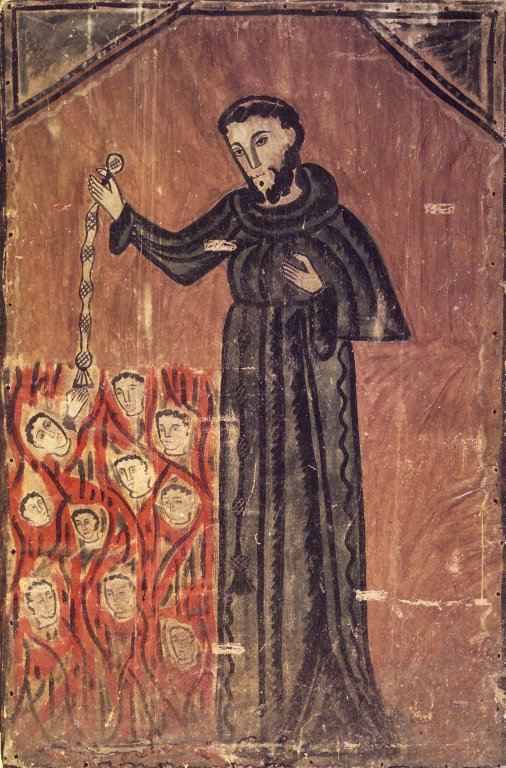
“The belief that love can reach into the afterlife, that reciprocal giving and receiving is possible, in which our affection for one another continues beyond the limits of death– this has been a fundamental conviction of Christianity throughout the ages, and it remains a source of comfort today.”
“… if Purgatory is simply purification through fire in the encounter with the Lord, Judge and Savior, how can a third person intervene, even if he is particularly close to the other? When we ask such a question, we should recall that no man is an island, entire of itself. Our lives are involved with one another; through innumerable interactions they are linked together.
No one lives alone. No one sins alone. No one is saved alone. The lives of others continually spill over into mine: in what I think, say, do, and achieve. And conversely, my life spills over into that of others: for better and for worse. So my prayer for another is not something extraneous to that person, something external, not even after death. In the interconnectedness of Being, my gratitude to the other–my prayer for him– can play a small part in his purification. And for that there is no need to convert earthly time into God’s time: in the communion of souls simple terrestrial time is superseded. It is never too late to touch the heart of another, nor is it ever in vain.
In this way we further clarify an important element of the Christian concept of hope. Our hope is always essentially also hope for others; only thus is it truly hope for me too. As Christians we should never limit ourselves to asking: how can I save myself? We should also ask: what can I do in order that others may be saved and that for them to the star of hope may rise? Then I will have done my utmost for my own personal salvation as well.”
Pope Benedict XVI in Saved in Hope (Spe Salvi) [emphasis mine]
The title of this post comes from The Song of Songs, chapter 8, verse 6. It’s one of my favorite passages. And I think this passage from Spe Salvi gives a wonderful gloss on the passage, though I’m pretty sure Pope Benedict didn’t directly have it in mind here.
+ + +
About the necessity of Purgatory Pope Benedict says:
“This early Jewish idea of an intermediate state includes the view that these souls are not simply in a sort of temporary custody but, as the parable of the rich man illustrates, are already being punished or are experiencing a provisional form of bliss. There is also the idea that this state can involve purification and healing which mature the soul for communion with God. The early Church took up these concepts, and in the Western Church they gradually developed into the doctrine of Purgatory. [. . .]
With death our life-choice becomes definitive– our life stands before the judge. Our choice, which in the course of an entire life takes on a certain shape, can have a variety of forms.
There can be people who have totally destroyed their desire for truth and readiness to love, people for whom everything has become a lie, people who have lived for hatred and have suppressed all love within themselves. This is a terrifying thought, but alarming profiles of this type can be seen in certain figures from our own history. In such people all would be beyond remedy and the destruction of the good would be irrevocable: this is what we mean by the word Hell
On the other hand, there can be people who are utterly pure, completely permeated by God, and thus fully open to their neighbors– people for whom communion with God even now gives direction to their entire being and whose journey towards God only brings to fulfillment what they already are.
Yet we know from experience that neither case is normal in human life. For the great majority of people– we may suppose– there remains in the depths of their being an ultimate interior openness to truth, to love, to God. In the concrete choice of life, however, it is covered over by ever new compromises with evil– much filth covers purity, but the thirst for purity remains, and it still constantly re-emerges from all that is base and remains present in the soul. What happens to such individuals when they appear before the Judge? Will all the impurity they have amassed through life suddenly cease to matter? What else might occur?
[. . .]In this text, it is in any case evident that our salvation can take different forms, that some of what is built may be burned down, that in order to be saved we personally have to pass through “fire” so as to become fully open to receiving God and able to take our place at the table of the eternal marriage feast.”
